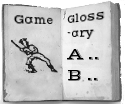Pize Ball: Difference between revisions
No edit summary |
Bsallardice (talk | contribs) No edit summary |
||
| (One intermediate revision by one other user not shown) | |||
| Line 6: | Line 6: | ||
|Description=<p>a game defined in the OED as “a game similar to Rounders in which a ball is hit with the flat of the hand.” The game is mainly associated with the English North Country, and is said to feature three or four ‘tuts,’ or stopping-places. The first cited use appeared in 1796. Gomme (page 45) adds that if the batter-runner is hit before reaching on of the “tuts” he is “said to be <em>burnt</em>, or out.</p> | |Description=<p>a game defined in the OED as “a game similar to Rounders in which a ball is hit with the flat of the hand.” The game is mainly associated with the English North Country, and is said to feature three or four ‘tuts,’ or stopping-places. The first cited use appeared in 1796. Gomme (page 45) adds that if the batter-runner is hit before reaching on of the “tuts” he is “said to be <em>burnt</em>, or out.</p> | ||
|Sources=<p><span>Alice Bertha Gomme, </span><span style="text-decoration: underline;">The Traditional Games of England, Scotland, and Ireland<em>, </em></span>Volume 2 (New York: Dover [reprint -- original publication 1898], 1964)<span>, page 45.</span></p> | |Sources=<p><span>Alice Bertha Gomme, </span><span style="text-decoration: underline;">The Traditional Games of England, Scotland, and Ireland<em>, </em></span>Volume 2 (New York: Dover [reprint -- original publication 1898], 1964)<span>, page 45.</span></p> | ||
|Comment=<p>David Block in Pastime Lost posits that "pize-ball" and "tut-ball" were regional names for English baseball. I would toss in that "pize-ball" may well be a rounded-down form of dialectical "pizin-ball" i.e. poison-ball, which calls to mind the French <em>la balle empoisonnee</em> or Poison Ball: a very similar game where, again, the ball was swatted with the hand. --W C Hicklin</p> | |||
<p>From Gomme, p. 45:</p> | |||
<p>"Pize Ball</p> | |||
<p>Sides are picked ; as, for example, six on one side and six on the other, and three or four marks or tuts are fixed in a field. Six go out to field, as in cricket, and one of these</p> | |||
<p>throws the ball to one of those who remain "at home," and the one "at home" strikes or pizes it with his hand. After pizing it he runs to one of the " tuts," but if before he can get to the " tut " he is struck with the ball by one of those in the field, he is said to be bumt^ or out. In that case the other side go out to field — ^Addy*s Sheffield Glossary. See " Rounders."</p> | |||
|Has Supplemental Text=No | |Has Supplemental Text=No | ||
}} | }} | ||
Latest revision as of 05:06, 25 June 2023
| Game | Pize Ball |
|---|---|
| Game Family | Kickball |
| Location | |
| Regions | |
| Eras | Predecessor |
| Invented | No |
| Tags | |
| Description | a game defined in the OED as “a game similar to Rounders in which a ball is hit with the flat of the hand.” The game is mainly associated with the English North Country, and is said to feature three or four ‘tuts,’ or stopping-places. The first cited use appeared in 1796. Gomme (page 45) adds that if the batter-runner is hit before reaching on of the “tuts” he is “said to be burnt, or out. |
| Sources | Alice Bertha Gomme, The Traditional Games of England, Scotland, and Ireland, Volume 2 (New York: Dover [reprint -- original publication 1898], 1964), page 45. |
| Source Image | [[Image:|left|thumb]] |
| Comment | David Block in Pastime Lost posits that "pize-ball" and "tut-ball" were regional names for English baseball. I would toss in that "pize-ball" may well be a rounded-down form of dialectical "pizin-ball" i.e. poison-ball, which calls to mind the French la balle empoisonnee or Poison Ball: a very similar game where, again, the ball was swatted with the hand. --W C Hicklin From Gomme, p. 45: "Pize Ball Sides are picked ; as, for example, six on one side and six on the other, and three or four marks or tuts are fixed in a field. Six go out to field, as in cricket, and one of these throws the ball to one of those who remain "at home," and the one "at home" strikes or pizes it with his hand. After pizing it he runs to one of the " tuts," but if before he can get to the " tut " he is struck with the ball by one of those in the field, he is said to be bumt^ or out. In that case the other side go out to field — ^Addy*s Sheffield Glossary. See " Rounders." Edit with form to add a comment |
| Query | Edit with form to add a query |
| Has Supplemental Text |
Comments
<comments voting="Plus" />
